|
|
I am deeply grateful to the amazing efforts of
Prof. Turkayya Ataov. Before the pro-Armenian genocide juggernaut succeeded
with their intimidation tactics and frightened opposing academicians from this
debate... by such underhanded tactics as taking them to court and subjecting
their reputations to smear campaigns, Professor Ataov was active in exposing
the many fabrications and falsifications of the Armenians... which the reader
can get an idea of in TATís forgeries page. (See link at page bottom.)
Prof. Ataov appears to have been keeping a comparatively low profile in recent
years (that has been my impression, anyway), but he paid a visit to New York
in early 2005. I wish to thank those involved with conducting this interview,
and I made use of the opportunity to suggest a few of the technical questions
Iím glad to see had been asked.
Itís obvious Prof. Ataov comes across as a wholly charming and wonderful
man, reeking of integrity. Itís important to get an idea of his personality,
because we get a different impression from the naturally scholarly tone of the
many works he has contributed. Naturally, the ethics-challenged propaganda
machinery, who hates for you to consider the real facts Prof. Ataov and those
like him present, are quick to degrade their character in whatever ways they
can.
For example, Harut Sassounian, publisher/journalist of a Californian Armenian
newspaper, is on record for calling Prof. Ataov a "charlatan," when
the real charlatan is a historian (or journalist, for that matter) who
exclusively presents one side of a story. Prof. Ataov has also been accused of
being an agent of the ďsinisterĒ Turkish government, and thereís nothing
new there. Prof. Justin McCarthy is similarly accused, without ó as usual
ó any proof. (Sassounian, among so many other agenda-ridden agents, has also
called McCarthy a ďcharlatan,Ē unmindful of the libel laws in our nation.
But, as Kapriel S. Papazian told us in ďPatriotism Perverted,Ē
fanatical Armenians have a way of throwing ďPrudence... to the winds,Ē
as they did when they betrayed their Ottoman nation during WWI. [Prof. Ataov
analyzed Papazianís book, and excerpts may be read here.] A response by Prof. McCarthy on attacks upon
his character may be read if you
[click here]
I myself was
the target of a campaign, instigated by an Armenian newspaper, that
attempted to have me fired from my university. Letters and telephone calls
from all over the United States came to the president of my university,
demanding my dismissal because I denied the "Armenian Genocide."
We have the tenure system in the United States, a system that guarantees
that senior professors cannot be fired for what they teach and write, and my
university president defended my rights. But a younger professor might
understandably be afraid to write on the Armenians if he knew he faced the
sort of ordeal that has been faced by others.
To me, the
worst of all is being accused of being the kind of politicized nationalist
scholar I so detest. False reasons are invented to explain why I say this --
my mother is a Turk, my wife is a Turk, I am paid large sums by the Turkish
government. None of these things is true, but it would not affect my
writings one bit if they were. The way to challenge a scholar's work is to
read his writings and respond to them with your own scholarship, not to
attack his character.
From "Let Historians Decide on So-called Genocide"
[Close]
To get an idea of Prof. Ataovís
impressive credentials, here is a biography I came across on the Internet:
Professor Turkkaya Ataov is Professor Emeritus of International Relations,
at Ankara University, Turkey, where he has taught, researched and published
for over four decades. He conducted his graduate studies in the United States,
earning an M.A. in International Relations from Syracuse University, M.A. in
Economics from NYU, and Ph.D. in Political Science from Maxwell Graduate
School Syracuse University. Professor Ataov has published over one hundred
books and a few hundred scholarly articles in over 20 languages. Most
recently, he published Kashmir and Neighbours (UK, Ashgate, 2001),
Discrimination and Conflict (Geneva, Eaford, 2001), and The Armenians in the
Late Ottoman Period (Ankara, Turkish Historical Society, 2002). Professor
Ataov received presidential medals from Italy, Federal Yugoslavia, and
Hungary, as well as medals of honor from the Macedonian Historical Research
Center, Russian Academy of Sciences, Bophuthatswana University (South Africa),
and the Turkish Grand National Assembly.
My gratitude once again to those involved with the preparation of this
interview and the photographs, a TAT exclusive. Certain underlined
statements may be clicked on to hear the professorís words, in his own
endearing voice!
|
|
|
| The
Interview |
TAT: Professor Ataov, what has been keeping you busy
of late?
ATAOV: I started studying and publishing about the modern issue of Armenian-Turkish
relations in our history beginning with the early 1980s so it must be now more than 25
years; but Iíve not been idle before that nor after that. Iím generally known by
different groups of people all over by different nations. For example in the eyes of the
Arabs, Iíve published about Palestine, in terms of quantity, perhaps more than any other
person in the world. Iíve spent some time studying about the minorities in the Balkans;
and I have taken up since 1976, together with a number of friends, connected with the United
Nations, the struggle against apartheid in South Africa. I was the only Turk, together with
my wife, to be invited by Nelson Mandela during the change of the regime.
The reason why I had to (consider undertaking) Armenian-Turkish relations was that two
Turkish diplomats were assassinated in 1973.
TAT: You mean you didnít study the genocide issue before that?
ATAOV: I didnít study it before that, no. (Sometimes the Turks have been criticized;
their) official circles pretended such a thing did not exist at all. This is not the case;
the reason why the founding fathers of the republic did not analyze and teach, educate the
people is because they wanted to rear new generations that looked to the future and not the
past.
TAT: The impression is that they were trying to sweep crimes under the rug.
ATAOV: This is the wrong interpretation; they knew what had happened. They also knew many
Turks had been killed by these events. Of course, one cannot be sure of the exact number.
But thereís also another small point that is connected. We have, as Turks, gone through
very difficult times, especially during the 19th century. In the Balkans, the Crimea, and
also the Caucasus, and theyíve been subjected to extermination. The whole thing amounts to
about 11 million people, most of them Turks, adversely affected by these events. There are
still very few Turks in Macedonia, parts of small enclaves of the former Yugoslavia, but
this is only a small fraction of what had existed since 1820. There was a radical change
beginning with the Greek war in 1821. There was an ethnic cleansing of the Turks in the
Balkans..
TAT: Why doesnít the world care about...
ATAOV: The world doesnít know it, doesnít care about it. Of course, there is enough
material not only in our archives, but that of other countries. And we know that history
cannot be explained, understood and taught without proper references. Now we knew that from
our own experience. Perhaps the leading Western scholar has written a very good scholarly
book about this, Professor Justin McCarthy, and itís called ďDeath and Exile.Ē The century beginning in 1821 and
ending 1922, was the darkest century in our history.
There is a long list of people, most of whom belonged to one or the other of the Turkic
peoples. But some of them were not even Turks, as with the Albanians. So if somebody, after
the establishment of the Turkish republic in 1923, if some people had said that certain
things had occurred during the first world war, let us discuss this, then more, many more
people would have said, before that, let us discuss the genocide and the forceful expulsion
from our ancient lands. This should be the number one agenda that we should discuss. But
this would have created a new generation of revengists...
TAT: What?
ATAOV: In other words, a new generation of people who wanted to take revenge, reprisals, of
what had already happened to themselves, their previous generations and so on. Some of these
people remembered that they had been living somewhere else before. They could have demanded
to discuss this before discussing any other. Because what is involved is the death of more
than 5 million people, or close to 5.5 million people, and the forceful expulsion of another
five-and-a-half-million, together making eleven million, which is, I think more than any
other figure connected to the idea of a genocide.
We were forced to bring this up now, because so much injustice is being done to us. If we
had to remember something, this would have been the first thing for us to remember.
|
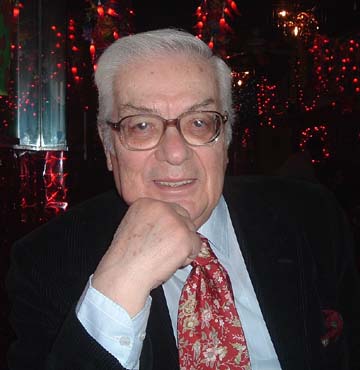
|
TAT: Professor Ataov, you taught at Ankara
University for how many years?
ATAOV: Close to forty-one years.
TAT: What connection has the Turkish government had with your teaching?
ATAOV: None.
TAT: We are told that you are a spokesman for the Turkish government.
ATAOV: Well, Iím presenting a second point of view; I think there is nothing wrong
with that. Just to pretend that only an entrenched point of view can be true is
scientifically incorrect. The (commonly accepted) interpretation of the history of our
relations with the Armenians is wrong in a number of ways ó let me add, it is full
of a number of lies. There is a lack of proper references, certain facts,
documentation even signed by prominent Armenians such as Boghos Nubar Pasha. We have certain documents in our hands. We
have the works, published books of Armen Garo (or Pastermadjian), who was one of the generals of an
army of 150,000; of General Antranik,
and a number of other people such as Hagopian, and so on, connected with the armed
revolts of the Armenians. Not only books, but a series of articles. In spite of this,
these facts, admissions and confessions, sometimes you run into the works,
suppositions of certain other Armenians, saying that theyíve absolutely done
nothing. I would call that a lie, or at least a contradiction... a terrible
contradiction.
TAT: How ironic you would say that, because you are perceived as the lawyer for the
criminal; you know that your client committed murder. So why should we believe you, is
what they argue.
ATAOV: There is a misconception ó a terrible misconception ó as if the Turks can
only be victimizers, but never victims. This is wrong. Thatís a prejudice, a biased
approach; entrenched psychologically, anthropologically, it cannot be correct.
Historically, it cannot be correct. Itís one of the ironies of the situation, that
one party is always right and the other party is wrong.
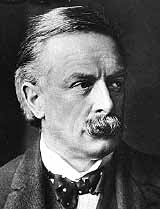 |
|
Lloyd
George |
For example, at the end of the first world war,
Lloyd George said the Turk (has not contributed to civilization, having not produced)
any literary person, any artists worth mentioning, and should go back to where he came
from, the Arabian deserts. Now this sentence is full of errors (and shows the personís
ignorance). Lloyd George could have very well read six volumes of his compatriot,
Professor (E. J. W.) Gibb Gibb has produced
wonderful, scholarly treatises on Turkish literature. Architect Sinan is a typical
renaissance man; he created not only (a number of) mosques and (musjids, smaller
mosques), some churches ó Iíve seen one, a small church near Sofia; bridges over
the Danube Saray. He was a genius. Yunus Emre, a man born as a poet, just like William
Shakespeare was. (Another example or two are cited.)
To them, such people did not exist.
|
| |
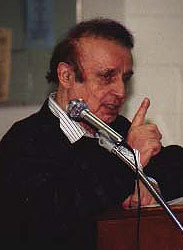 |
|
Vahakn Dadrian |
TAT: Does Vahakn Dadrian really believe there was an Armenian genocide?
ATAOV: Well Dadrian does, and a number of other people also do, but they donít know enough
about the other side of the coin; itís very important....
TAT: But he must have studied everything; he really got into it.
ATAOV: Well, if he has studied everything,
then he has to state everything. Itís not enough to study it, you have to be able to
reflect those things. For instance, number one, we did not take any territory from
an Armenian state. We didnít fight against them. We didnít disperse them in Anatolia or
the Caucasus. They were dispersed long before we came. We had very good relations, brotherly
relations, friendly relations, peaceful coexistence with the Armenians, for more than 800
years. These are also important facts. They should mention such for a systematic and
balanced analysis.
When we came into contact with them, we were the first ones to recognize the Armenian
Gregorian community as a distinct, Christian group of people. And they had not gained that
kind of recognition from any Christian church, whether Catholic or Orthodox. Because the
Armenian Gregorian church was monotheized, and different from the interpretation of the
other churches. According to the Islamic notion of (millet),
they could pursue their religious convictions in any way they liked, that the central
government would not interfere with them, that they could speak their own language, and that
they could live and work the way they wanted to, and they could hold public office.
TAT: You will find many Armenian historians saying quite the reverse of that, so let me
ask you: do you know of any Armenian historian who recognizes these factors?
ATAOV: I didnít read them, of course I read what the Armenians write. For instance, I donít
remember Dadrian ever mentioning that there were so many Armenian-Ottoman ambassadors,
lieutenant governors, diplomats, consuls, members of parliament, many in the professional
businesses, and moreover, just one year before the outbreak of the first world war, that is,
in the year 1913, the Ottoman Minister of Foreign Affairs was an Armenian, Gabriel
Nouradungian.
Now there is the drive to equate the Jewish Holocaust with Turkish relations with the
Armenians. Can you imagine the Nazi
regime, for instance, appointing a Jew to the position of the minister of foreign affairs?
Thatís impossible. This is not a coincidence. The Armenians lived and worked and
flourished, got educated with the consent and the wish of the Turkish people as well.
|
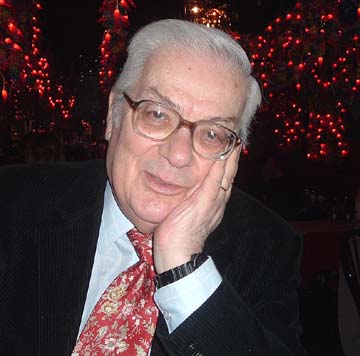
|
TAT: But what I find interesting is that there
are a number of Turkish scholars who go with the Armenian point of view, and yet I
have yet to come across one contemporary Armenian historian who gives credence to any
of the things you are saying. Why is this?
ATAOV: Well, Iíve published a lot about this issue. There is no mention in any of
the Armenian publications. I take this to mean that they cannot find anything to
criticize. Otherwise, they would have done this. And Iíve asked them to criticize,
if they can. If they can find, for instance, a falsification of some sort. I have found so many falsifications
in Armenian writings, and Iíve exposed them.* [See
TAT's Forgeries page, for
example]
There are so many misconceptions, so many omissions, and moreover, it looks as if only
the Armenians have suffered. Of course, war itself is cruelty no matter where it
occurs. Now we are also living through war right now, in the course of our
conversation. There are some people who are killing others, and some people being
killed by others, right now. This is a cruel thing. But you can also see even today
that the losses of one of the parties is not mentioned, but the losses of the others
are mentioned. And the losses of those that are mentioned are much less than the
others.
There are such things in the latest chapter of Armenian-Turkish relations, as well. It
looked as if the Turks did not suffer anything, but they made others suffer. This is
not correct. There was a revolt in Van, which was the farthest province of the Ottoman
Empire (and still is of the Republic of Turkey) and there was an armed revolt there.
There are confessions of that in various Armenian publications. And if this has
happened, then itís not a matter of 10 or 15 people shooting with revolvers in their
hands. Cannons were used, machine guns were used; and even if you look up Prof.
Hovannisianís book, ďArmenia on the Road to Independence,Ē he says there
was, in the Caucasus for instance, an Armenian army of 150,000 soldiers. Plus, he
says, in the same sentence, there were guerilla fighters and so on. Now this figure is
much more than the American soldiers right now employed in Iraq.
In other words, the central administration in Turkey was facing an armed revolt,
supported by weapons, money, diplomatic support and so on by the approaching, invading
and expanding Tsarist Russian armies. Headed, in the eastern front, by General (Loris)
Melikoff, who was himself an Armenian-Russian.
If you look up French documents which are available, and which I have printed in some
of my publications, the responsible people say, yes. Among our adversaries, we were
fighting against the French as well, and their generals say yes, there was a revolt in
the east, and the Turks were right in relocating them.
[For example]
French General M. Larcher
observed that "the Armenian population in the zone of operations overtly
exhibited a common cause with the Russians...some migrating to Transcaucasia...
[and] frequently attacking Turkish convoys." He noted that "the loyalty of
the Armenians recruited in the Turkish troops seemed doubtful."
From Ataov's "'Armenian Question' Conflict, Trauma & Objectivity;
the likely source is M. Larcher, La Guerre turque dans le guerre mondiale, Paris,
Etienne Chiron, 1926
[Close]
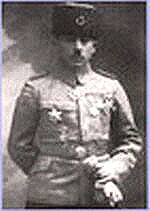 |
|
Rafael de
Nogales |
TAT: The Venezuelan adventurer, Rafael de Nogales, said there was no Van revolt;
the Armenians were self-defending.
ATAOV: No, there was a revolt. If you look up Katchaznouni for instance, he said....
TAT: I believe it; but why would de Nogales have said that? (Holdwater note: the questioner was mistaken; de Nogales documented the uprising: "
...the Armenians of the vilayet of Van rose en masse...")
ATAOV: Well, I donít know. Maybe he didnít read Katchaznouniís book. Because
Katchaznouni, who happens to be the first prime minister of the Independent Republic
of Armenia, in the 1920s, when he made that talk in Bucharest, in 1923, addressing the
delegates of the Dashnak party. He said, the Armenians had started mobilizing and
resorting to force even in the fall of 1914.
TAT: He was talking about the Armenians of Transcaucasia, though.
ATAOV: Yes, he was... No, both sides.
TAT: Well, the Armenians say it was only the Russian-Armenians.
ATAOV: No, in both sides; they were...
TAT: I know that. But thatís what the Armenians say...
|
| |
TAT: ...Dadrian also says ordinary Turks participated en masse in the killings. What do
you think about that?
ATAOV: Ordinary Turks?
TAT: En masse. Not just a few, but...
ATAOV: No, this cannot...
TAT: ... a whole bunch.
ATAOV: This
cannot be dare said. It never happened, even it didnít happen... Well, did all
Americans en masse participate in the killing of the original inhabitants of the
United States? No. They didnít, even not here. And not every German
participated in what happened during the Nazi period. Iím not comparing, actually,
the Turkish situation with any of these countries. There was a Holocaust, a genocide
in Germany. There was no action, no development, that fits into the description that
you find in the 1948 genocide convention. Some people, of course, attacked some of the
columns and some people were killed; but they were a small fraction. Iím not
minimizing by quoting a much smaller number; death is death, there is no doubt about
that. But there were also deaths on the other side. Not only in 1915, but in the 1896
events and even before that. There was a British source, a certain Captain Norman, who
was sent to investigate the events of 1895-96, and he prepared a report called ďThe Armenians Unmasked,Ē and I have a
copy of this report that is in his own handwriting.
There he says, for instance, in the little town of Birecik which is in Urfa, the
southeastern part of Turkey, The London Times wrote that 2,000
Armenians were killed there. Now if I remember the figure correctly right now, about
718 people or so lived in Biricik at that time, so 2,000 could not be killed.
TAT: I believe the Armenians have claimed Captain Norman as working in public
relations for the British, and was biased.
ATAOV: Well, they may make any interpretation that they like, but I am persuaded by
what he wrote and what he signed. He came here and observed certain things, and he
quotes facts and figures. He also said the ambassadorís council was formed, they
investigated the issue, and found only five lives were lost, or something like that.
Usually, the alternative figure is very low; whatever the second figure is, itís
much lower ó dramatically much lower ó than something that had happened, printed
in The London Times. This is the point. Itís always an exaggeration; always
a tremendous exaggeration. This has to be recognized.
TAT: The Armenians also say the 235 Armenian leaders who were arrested in Istanbul
on April 24 were all killed on the same day. What happened to those Armenians?
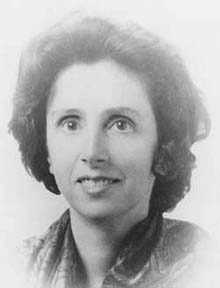 |
|
Louise
Nalbandian |
ATAOV: Well, I have no particular information on
(their fate), frankly. They were rounded up not because they were Armenians, but
because they had connections with what was going on in the east. And there is enough
evidence in the Armenian publications saying that, even earlier than that ó for
instance, Louise Nalbandian wrote there was a coordination with what was going on in
the east, and the Armenian intellectuals living in Istanbul. Now, the Ottoman police,
just like any other security agency, may have made certain mistakes insofar as some of
the individuals were concerned. Usually, the Ottoman police was well informed, and
(the Armenians) were rounded up because they had certain connections with them; they
gave the ideas and the way of thinking...
|
| |
TAT: Dadrian tells us that Behaeddin Shakir went
door-to-door, in his car, town to town, relaying secret orders. What do you think about
that?
ATAOV: Well, itís very difficult to do that. For instance, as Iíve heard, in one of the
universities, a terribly biased professor said, one million Armenians were killed. Itís
not easy to do that. I mean, the way you say it, it takes a few seconds to say it. But to do
that is very difficult.
I appeared as a witness of authority in two Paris trials (1984-85); the first one concerned
an attack on the Turkish consul-general in Paris, the killing of a Turk, and the wounding of
another. The second one was the bomb blast at Orly airport, which killed some people and
wounded about 60. I was asked to participate by the Paris court, as a person who knows this
subject. I was surprised to see in one of the daily papers called ďLa Liberation,Ē a
certain Veronique Brocard, whom I met and talked to afterwards, published in one year three
articles about the trials, and also about the issue, and in those three articles, she kept
adding five hundred thousand Armenians dead. And I drew her attention to that, I produced
these articles signed by her, one page long all of them. One states that the Turks killed
one million, and the other one one-and-a-half-million, and the other one, close to two
million.**
In other words, she kept asking, with tremendous ease, and with no sense of responsibility,
five hundred thousand in each case. And I asked her, is it fair for you to do that? What
documentation do you have? Can you produce anything that would convince me, or any other
person? Of course, if I wrote to you, which I tried to do, that this is false, and that I
have a different interpretation and a different opinion about these events, you declined to
print it. In that particular case I called up the publisher, couldnít find him, left word,
and was promised he would call me back, which he didnít, in Paris. And then I inquired to
the possibility of talking to the proprietor of that paper, and tried to tell him this is
what the people working in the paper were doing, that this was not fair reporting, they were
misleading the public, and that they were not telling them the truth. He said he would
inquire and would phone me back, and never phoned me back. And then I tried to also talk to
this lady, and she gave me an appointment which she didnít keep, and I spent another few
days in Paris because she didnít show up. And when I visited Paris much later, I had a
chance to talk to her.
But one of the things I said to her was that, I came to know she was single and not married,
but perhaps if she gets married and has a kid in the future, well, that kid reads these
articles, she might in the future be startled to see her kidís mother added five hundred
thousand to the list of the dead. Wouldnít
that boy or girl ask the mother, how could you do that? Itís such an irresponsible
attitude.
We are confronted with this, unfortunately. So much propaganda is involved in this. So much
propaganda was also involved in the so-called British Blue Book, for instance.
|
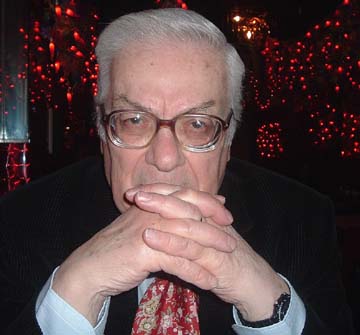
|
TAT: Dadrian always manages to come up with
sources, where someone says there were Turkish Mengeles, and that Armenian children
were poisoned...
ATAOV: None of that is true, no. Now there is an effort to draw artificial parallels
between the Jewish Holocaust, and our relations. That is not only an exaggeration, itís
an outright lie. Since (the Holocaust) is well established, they want to enter certain museums, the
minds of people, on the coattails of what happened to the Jews. This is very unfair,
not only against the Jews, but also against the Turks. Or vice versa; not only
very unfair against the Turks, but also against the Jews.
They passed through the Holocaust; there is a thing called anti-Semitism that is not
necessarily limited to the Nazi regime; it goes back centuries, to letís say the
year 38 AD, in Alexandria, the Jews were slaughtered during the Roman Empire. All the
way from that, there is anti-Semitism simmering. Nothing of that sort can be said
about the Ottoman or Turkish attitude, or the Muslim attitude toward the Armenians.
TAT: Dadrian also tells us a CUP representative went to prisons, accompanied by a
doctor, and they made sure to select
criminals when they recruited gendarmes.
ATAOV: Well, I donít know how they know that...
TAT: Probably the 1919 trials.
ATAOV: Well, you cannot be sure of that. There were missionaries in Turkey (since the 1830s?) and they created such an
understanding in the minds of the Armenians that the Turks were Muslims, and they can
do such things. The origins of these go back to the biased interpretations of the
missionaries. They bear responsibility for the bloodshed that occurred afterwards,
because they gave the Armenians a sense of superiority, just because they are
Christians. And also because they had certain ďEuropeanĒ racial characteristics
that put them above the Muslims, and especially the Turks, and so on. Now this is sort
of an ďeducation,Ē in quotation marks.
The way they compare Talat Pasha, for instance, with Himmler: nothing of the sort. He
was the person who allowed American missionaries to help Armenian children; feed them,
clothe them and educate them, in 1915-16. Although Turkey and the United States were
not fighting against each other were nevertheless in the opposing camps of the war.***
Just let me know of another government that has been so lenient; this action of the
minister of interior, in a sense, saved the lives of tens of thousands of Armenian
children dying from starvation. Not killing, but starvation, because there wasnít
enough food to go around. When Turks died. And these people, the missionaries, did not
help the Turks the way they helped the Armenians, of course. And we have photographs
printed in the books written by Armenians, showing them properly clothed, healthy, in
the schools and churches set up by those Protestant missionaries. Educated with the
money that was collected by using the Turks for having slaughtered and so forth. Itís
really a comedy, and a drama at the same time.
This comparison, for example you read a book written by an Armenian, this Ottoman
official was actually like the Nazi so-and-so. Itís a drive, a motivation, a tactic,
to equate the two events. They cannot be compared in any way. You feel this bloodshed
(of the Jews happening in France, in Germany, in Russia, in Poland) and such things
happened over and over again. But the Turks did not have that kind of a mentality,
that kind of an approach, that kind of a relationship, neither with the Jews, nor with
the Armenians, nor with the Greeks.
Now as far as the Armenians are concerned, there has been some bloodshed, but because
they revolted in the east, by arms. The Americans brought the Japanese together, and
none of them had ever resorted to force against their own government. This cannot be
said, this should not be said, about the behavior of the Armenians.
Not every Armenian may have been a part of that, but enough had been a part of that;
there is no doubt about that. There were battalions formed, there are even references
in the Armenian sources to even bigger military formations with cannons, and machine
guns, and so on. They were in the war. They published books with this title: ďWe
won the war for the allies.Ē These are not the exact words, but it means that; I
can look it up in some of my research works, published matter where I give verbatim
titles in the footnotes. (Holdwater: Similar Examples.)
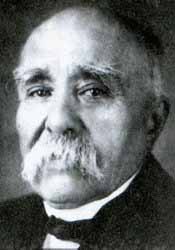 |
|
Georges
Clemenceau |
There was an acknowledgment coming from Lloyd
George, Clemenceau, and a number of people who were on the winning side. Why did the
Russian Czar Nicholas II send a message of thanks and congratulations to the Armenian
people? Thank you very much for the support you are giving us, on both sides of the
border, he says. And so did the Russian governor of the Caucasus, expecting the
support of Armenians on both sides of the border, throughout the war. This is what
happened. How can we pretend that these things do not exist?
|
| |
TAT: Any parting words on how you believe this
debate may be resolved?
ATAOV: The Turks and the Armenians are two able people who lived together for centuries. Let
us not try to make them even more enemies of each other. We have no prejudice against them.
They revolted with arms, they attacked the Muslim quarters in the city of Van, they took
over that part of the province, they assisted the invading Tsarist armies, and the central
government resolved to make a decision to relocate them. Not all Armenians were relocated,
transferred, anyway. The Protestant Armenians were excepted; the Catholic Armenians were
excepted; the Armenians serving in the army were excepted; the Armenians serving in the
banks were excepted; the Armenians serving in the tobacco factories were excepted; the
Armenians working in certain areas like railroad construction, and so on, they were
excepted. Moreover, together with their families; if one man was excepted, that meant his
wife, children, and other relatives were also excepted. And this is the absolute truth.
And they were not sent outside the country; they were not forced to leave, in a sense. They
were not kicked out of the frontiers of the state. They were sent to the southern parts, and
with the first decision of the central government was that this order of relocation should
not be understood as an order of killing them. And any attempt in this regard will be
punished very severely, and so on. And, moreover, the Turks who set up the trials and
convicted some of the people, and hanged some of the people.
But no such trials ever took place, convicting any Armenians, or any Russians, which have
caused the bloodshed, or at least the beginning of the bloodshed, to begin with. No such
things were ever done. And if you look at some of the publications, books written by the
Armenians, they are proud that they have killed certain Turks. This is the impression that
you get. In other words, you can kill one party, but not the other. There is such a
distinction from the very beginning.
|
A Few Holdwater Thoughts
|
* "Iíve asked them to criticize, if
they can. If they can find, for instance, a falsification of some sort.Ē The
professor is approaching the matter as a gentleman, and his kind heart has put to the
side the lack of ethics genocide-obsessed pro-Armenians are capable of. It is the very
duty of these pro-Armenians to criticize, to discredit, to perform their
smoke-and-mirror tricks. There is no end to the way in which they can come up with
explanations to cloud and confuse, as Vahakn Dadrian has magnificently attempted in
this rebutted paper.
** Itís far from uncommon for pro-Armenians to
irresponsibly play with figures, as the figures suit them ó taking as their role
model the Armenian Patriarch, who claimed 3 million as the Ottoman-Armenian population
during the Berlin Conference, quickly revising to 1,780,000. Here is how fast Peter
Balakian has changed his mind with Armenian mortality
figures, just like the unethical French reporter.
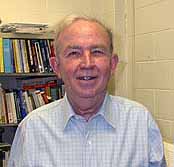 |
|
Prof.
Roger Smith |
*** Dr. Roger Smith, in an April 2005 genocide conference at
Fordham University presented by Dr. Ani Kalayjian, provided as reason for the Turkish
magnanimity (in their allowance of a hostile nationís representatives to care for
Armenians, a practice that had been going on to a lesser extent from generations past,
with access granted the missionaries): the Ottoman Empire wished to prevent the USA
from entering the war against the Turks. The Fuehrer was well aware the USA's entry in
W.W.II would amount to a death blow... if only Adolf "Who Remembers the
Extermination of the Armenians" Hitler had remembered this simple trick, and
allowed for Americans to care for the Jews in Auschwitz! There can be no shortage of
speculation among agenda-ridden genocide agents; the only factor they donít consider
is the truth.
|
| Some of Dr. Turkayya Ataov's
Essays are Featured on these TAT Pages: |
|
|